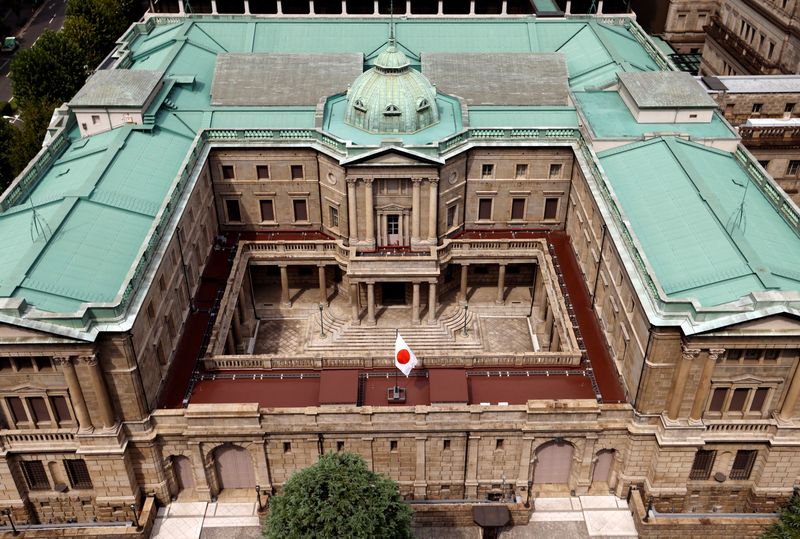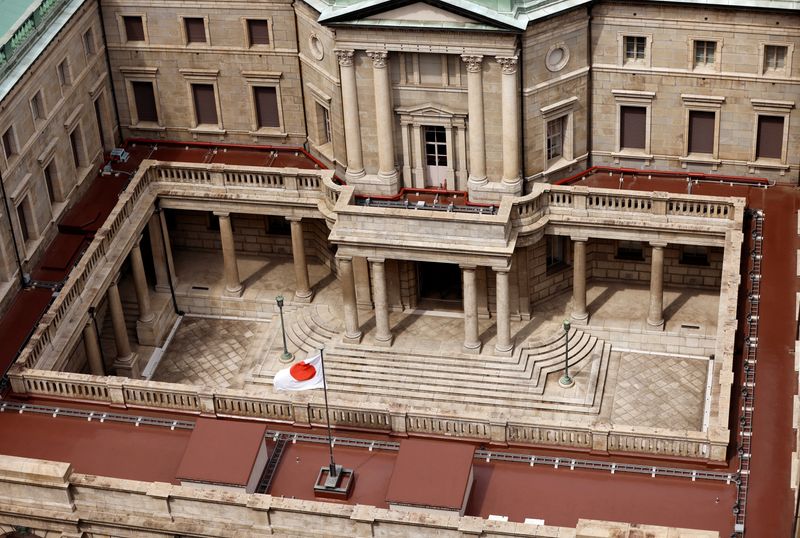By Leika Kihara and Tetsushi Kajimoto
TOKYO (Reuters) -The Bank of Japan maintained ultra-low interest rates on Friday and its pledge to keep supporting the economy until inflation sustainably hits its 2% target, suggesting it was in no rush to phase out its massive stimulus programme.
The BOJ's decision contrasts with those of U.S. and European central banks, which in recent meetings have signalled their resolve to keep borrowing costs high to rein in inflation.
Governor Kazuo Ueda said Japanese companies were hiking prices more than expected, preventing inflation from slowing, suggesting that conditions for dialing back monetary support were gradually falling into place.
But he stressed the need to spend more time assessing data, particularly wages and service prices, before raising interest rates.
"We have yet to foresee inflation stably and sustainably achieve our price target. That's why we must patiently maintain ultra-loose monetary policy," Ueda told a press briefing after the policy decision.
"Having said that, we will of course shift policy if achievement of our target is foreseen."
As widely expected, the BOJ maintained its short-term interest rate target of -0.1% and that for the 10-year bond yield around 0% at a two-day meeting that ended on Friday.
It also left unchanged an allowance band of 50 basis point set either side of the yield target, as well as a new hard cap of 1.0% adopted in July.
The central bank made no change in its forward guidance, retaining a pledge to "take additional easing measures without hesitation" if needed - language some market players thought might be changed to take on a more neutral tone.
The yen fell sharply on Ueda's remarks, dipping at one point to 148.32 to the dollar, taking its depreciation so far this year to more than 11%.
"I think it's rather dovish, and that's why we've seen the yen go past 148," said Alvin Tan, head of Asia FX strategy at RBC Capital Markets.
Markets have been rife with speculation the BOJ will soon end negative rates and its yield cap, as Japan's ultra-low rates draw criticism for weakening the yen and pushing up import costs.
Data earlier on Friday showed Japan's core inflation hit 3.1% in August, staying above the central bank's 2% target for a 17th straight month in a sign of broadening price pressures in the world's third-largest economy.
But BOJ policymakers have maintained that inflation could be transitory due to factors such as global oil prices, and may not reflect a solid pick-up in economic activity.
Market bets of a near-term policy shift heightened further after Ueda said in a recent interview the BOJ could have enough data by year-end to determine whether to end negative rates.
A Reuters poll for September showed most economists predicting an end to negative interest rates in 2024.
At the briefing, Ueda brushed aside the view that his remarks were a sign a policy shift was imminent, stressing that there were too many uncertainties to pre-determine the timing of an exit.
"For Japan to stably and sustainably achieve 2% inflation, we need to see strong demand support inflation. We need to confirm that a positive wage-inflation cycle has kicked off," Ueda said. "This is where we still need time."
The BOJ faces various challenges in exiting former Governor Haruhiko Kuroda's radical stimulus, including weak signs in the global economy and the risk of triggering a spike in bond yields that would boost the cost of funding Japan's huge public debt.
"We continue to believe that the BoJ will maintain the status quo at least until the midst of next year" to carefully assess whether its 2% inflation target could be achieved in a stable manner within Ueda's five-year term, said Norihiro Yamaguchi, senior economist at Oxford Economics.
But keeping ultra-low rates isn't without costs.
Growing prospects of higher-for-longer U.S. interest rates have pushed the yen down near the 150-per-dollar level, seen as Tokyo's line-in-the-sand for possible currency intervention.
While a weaker yen would help support flagging exports, it risks dampening consumer spending by pushing up import costs.
The currency's slide has triggered fresh verbal warnings by government officials, piling pressure on the BOJ to play its part to moderate the pain on households from rising living costs.

"It's desirable for currencies to move stably, reflecting fundamentals," Ueda said.
"Currency moves affect economic and price developments. We're monitoring currency moves carefully from the standpoint that they affect inflation."
